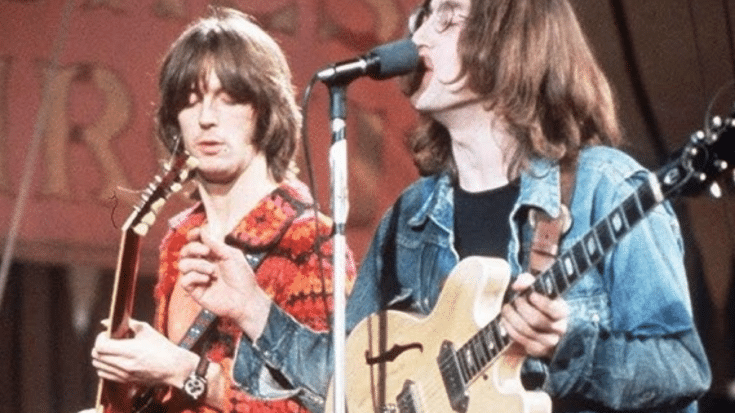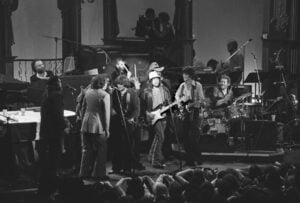7 Rock Stars Who Appeared on Other’s Albums in Secret

via ROYCE IN THE HOUSE / YouTube
Rock history is full of surprises, especially when it comes to secret collaborations. Many iconic musicians have quietly contributed to each other’s albums, sometimes going uncredited. These behind-the-scenes appearances highlight how interconnected the world of rock really is. Here are seven times rock stars made secret contributions to famous albums.
1. Eric Clapton on The Beatles’ “While My Guitar Gently Weeps”
When George Harrison wanted to add something special to “While My Guitar Gently Weeps” on The White Album, he turned to his friend Eric Clapton. Clapton agreed, laying down the now-famous lead guitar solo. Though he wasn’t officially credited on the album, his distinct style is unmistakable.
Clapton’s collaboration marked one of the rare instances where an outsider played a significant role on a Beatles track. Harrison later said Clapton’s involvement eased tensions in the studio, helping the band focus on the song’s creative direction.
2. David Bowie on Queen’s “Under Pressure”
“Under Pressure” became one of Queen’s most beloved songs, but it also featured David Bowie—a fact not widely known at first. Bowie contributed vocals and helped shape the song’s lyrics during an impromptu session at Queen’s studio in Switzerland.
Freddie Mercury and Bowie’s dynamic energy made the track unforgettable. Though initially a collaboration, Bowie’s involvement wasn’t heavily promoted, leaving many listeners unaware of his key role in the song’s creation.
3. Stevie Nicks on Tom Petty’s “Stop Draggin’ My Heart Around”
Stevie Nicks’ voice is featured prominently on “Stop Draggin’ My Heart Around,” but many people don’t realize the track originally belonged to Tom Petty and the Heartbreakers. Petty’s band recorded the song, but producer Jimmy Iovine decided it would work better as a duet.
Nicks and Petty’s collaboration became a major hit, blending their distinct styles. Though the song was released on Nicks’ solo album, its origins as a Heartbreakers track make it a fascinating example of secret teamwork.
4. Prince on Stevie Nicks’ “Stand Back”
Stevie Nicks wrote “Stand Back” after hearing Prince’s “Little Red Corvette.” Inspired by its rhythm, she called Prince to tell him about it. To her surprise, he showed up at the studio unannounced and contributed synthesizer parts to the track.
Prince never sought credit for his involvement, but Nicks often praised his input in interviews. His influence on the song’s sound adds a layer of intrigue to this 1980s classic.
5. Eddie Van Halen on Michael Jackson’s “Beat It”
Eddie Van Halen’s blistering guitar solo on “Beat It” transformed the song into a rock anthem, but his involvement was kept low-key at the time. Producer Quincy Jones reached out to Van Halen, who recorded the solo in just a few takes—and didn’t charge for his contribution.
Van Halen’s collaboration bridged the gap between rock and pop, bringing a unique edge to Jackson’s Thriller album. For years, many fans didn’t realize a rock legend was behind the iconic solo.
6. Phil Collins on Robert Plant’s “In the Mood”
After Led Zeppelin disbanded, Robert Plant began his solo career with the album The Principle of Moments. Drummer Phil Collins secretly contributed to several tracks, including “In the Mood,” adding his signature rhythmic style to Plant’s evolving sound.
Collins’ involvement helped Plant transition from Zeppelin’s hard rock to a more experimental solo style. Despite playing a crucial role, Collins’ work was downplayed, keeping the focus on Plant’s solo artistry.
7. Jeff Beck and Rod Stewart on Each Other’s Albums
Jeff Beck and Rod Stewart’s long history of working together included some secretive exchanges. Beck played guitar on Stewart’s hit “Infatuation,” adding his signature style without much fanfare. Similarly, Stewart lent his vocals to tracks on Beck’s solo albums, creating a blend of their distinctive talents.
Their collaborations reflected their mutual respect and long-standing partnership, often surprising fans who didn’t initially recognize their contributions to each other’s music.




















